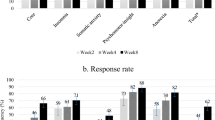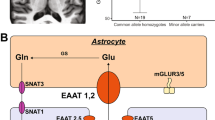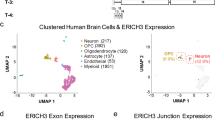Abstract
Evidence suggests that glycogen synthase kinase-3β (GSK3B) activity is increased significantly in the brain of patients with major depressive disorders (MDD). Inhibition of GSK3B is thought to be a key feature in the therapeutic mechanism of antidepressants. To investigate whether common genetic variants in the GSK3B gene are associated with MDD and the therapeutic response to antidepressants, four polymorphisms (rs334558 (−50 T>C), rs13321783 (IVS7+9227 A>G), rs2319398 (IVS7+11660 G>T) and rs6808874 (IVS11+4251 T>A)) of the GSK3B gene were genotyped in 230 Chinese MDD patients and 415 controls. Among the MDD patients, 168 accepted selective serotonin reuptake inhibitor (SSRI) (fluoxetine or citalopram) antidepressant treatment and therapeutic evaluation for 4 weeks and 117 for 8 weeks. Significant association with MDD was not shown in the alleles and genotypes of single loci or four-locus haplotypes. However, three of the four polymorphisms investigated were significantly associated with 4-week antidepressant therapeutic effect (P=0.002–0.011). Of the four-locus haplotype analysis, the GSK3B TAGT carriers showed a poorer response to antidepressants in 4-week (P<0.0001) and 8-week (P=0.015) evaluation compared with other haplotype groups and would quite likely be the non-remitter to 8-week antidepressant treatment (P=0.006). Our findings show, for the first time, that GSK3B genetic variants play a role in the SSRI antidepressant therapeutic response and support the hypothesis that drugs regulating GSK3B activity may represent a novel treatment strategy for MDD.
This is a preview of subscription content, access via your institution
Access options
Subscribe to this journal
Receive 6 print issues and online access
$259.00 per year
only $43.17 per issue
Buy this article
- Purchase on Springer Link
- Instant access to full article PDF
Prices may be subject to local taxes which are calculated during checkout

Similar content being viewed by others
References
Jope RS, Johnson GV . The glamour and gloom of glycogen synthase kinase-3. Trends Biochem Sci 2004; 29: 95–102.
Frame S, Cohen P, Biondi RM . A common phosphate binding site explains the unique substrate specificity of GSK3 and its inactivation by phosphorylation. Mol Cell 2001; 7: 1321–1327.
Li X, Zhu W, Roh MS, Friedman AB, Rosborough K, Jope RS . In vivo regulation of glycogen synthase kinase-3beta (GSK3beta) by serotonergic activity in mouse brain. Neuropsychopharmacology 2004; 29: 1426–1431.
Roh MS, Eom TY, Zmijewska AA, De Sarno P, Roth KA, Jope RS . Hypoxia activates glycogen synthase kinase-3 in mouse brain in vivo: protection by mood stabilizers and imipramine. Biol Psychiatry 2005; 57: 278–286.
Klein PS, Melton DA . A molecular mechanism for the effect of lithium on development. Proc Natl Acad Sci USA 1996; 93: 8455–8459.
Stambolic V, Ruel L, Woodgett JR . Lithium inhibits glycogen synthase kinase-3 activity and mimics wingless signalling in intact cells. Curr Biol 1996; 6: 1664–1668.
Li X, Friedman AB, Zhu W, Wang L, Boswell S, May RS et al. Lithium regulates glycogen synthase kinase-3beta in human peripheral blood mononuclear cells: implication in the treatment of bipolar disorder. Biol Psychiatry 2007; 61: 216–222.
D’Sa C, Duman RS . Antidepressants and neuroplasticity. Bipolar Disord 2002; 4: 183–194.
Mai L, Jope RS, Li X . BDNF-mediated signal transduction is modulated by GSK3beta and mood stabilizing agents. J Neurochem 2002; 82: 75–83.
Kaidanovich-Beilin O, Milman A, Weizman A, Pick CG, Eldar-Finkelman H . Rapid antidepressive-like activity of specific glycogen synthase kinase-3 inhibitor and its effect on beta-catenin in mouse hippocampus. Biol Psychiatry 2004; 55: 781–784.
Gould TD, Einat H, Bhat R, Manji HK . AR-A014418, a selective GSK-3 inhibitor, produces antidepressant-like effects in the forced swim test. Int J Neuropsychopharmacol 2004; 7: 387–390.
Karege F, Perroud N, Burkhardt S, Schwald M, Ballmann E, La Harpe R et al. Alteration in kinase activity but not in protein levels of protein kinase B and glycogen synthase kinase-3beta in ventral prefrontal cortex of depressed suicide victims. Biol Psychiatry 2007; 61: 240–245.
Hamilton M . Development of a rating scale for primary depressive illness. Br J Soc Clin Psychol 1967; 6: 278–296.
Yu YW, Tsai SJ, Chen TJ, Lin CH, Hong CJ . Association study of the serotonin transporter promoter polymorphism and symptomatology and antidepressant response in major depressive disorders. Mol Psychiatry 2002; 7: 1115–1119.
Gabriel SB, Schaffner SF, Nguyen H, Moore JM, Roy J, Blumenstiel B et al. The structure of haplotype blocks in the human genome. Science 2002; 296: 2225–2229.
Kwok JB, Hallupp M, Loy CT, Chan DK, Woo J, Mellick GD et al. GSK3B polymorphisms alter transcription and splicing in Parkinson's disease. Ann Neurol 2005; 58: 829–839.
Lerer B, Macciardi F . Pharmacogenetics of antidepressant and mood-stabilizing drugs: a review of candidate-gene studies and future research directions. Int J Neuropsychopharmacol 2002; 5: 255–275.
Benedetti F, Serretti A, Colombo C, Lorenzi C, Tubazio V, Smeraldi E . A glycogen synthase kinase 3-beta promoter gene single nucleotide polymorphism is associated with age at onset and response to total sleep deprivation in bipolar depression. Neurosci Lett 2004; 368: 123–126.
Russ C, Lovestone S, Powell JF . Identification of sequence variants and analysis of the role of the glycogen synthase kinase 3 beta gene and promoter in late onset Alzheimer's disease. Mol Psychiatry 2001; 6: 320–324.
Cardon LR, Bell JI . Association study designs for complex diseases. Nat Rev Genet 2001; 2: 91–99.
Rausch JL, Johnson ME, Fei YJ, Li JQ, Shendarkar N, Hobby HM et al. Initial conditions of serotonin transporter kinetics and genotype: influence on SSRI treatment trial outcome. Biol Psychiatry 2002; 51: 723–732.
Burke WJ, Hendricks SE, McArthur-Campbell D, Jacques D, Stull T . Fluoxetine and norfluoxetine serum concentrations and clinical response in weekly versus daily dosing. Psychopharmacol Bull 1996; 32: 27–32.
Acknowledgements
This work was supported by Grant NSC 92-2314-B-075-087 from the National Science Council, Taiwan and Grant VGH-92-161 from the Taipei Veterans General Hospital. We thank Jer-Yuan Wu, the National Genotyping Center and the National Clinical Core at Academia Sinica, Taiwan, for genotyping support.
Author information
Authors and Affiliations
Corresponding author
Additional information
None declared.
Supplementary Information accompanies the paper on the The Pharmacogenomics Journal website (http://www.nature.com/tpj)
Supplementary information
Rights and permissions
About this article
Cite this article
Tsai, SJ., Liou, YJ., Hong, CJ. et al. Glycogen synthase kinase-3β gene is associated with antidepressant treatment response in Chinese major depressive disorder. Pharmacogenomics J 8, 384–390 (2008). https://doi.org/10.1038/sj.tpj.6500486
Received:
Revised:
Accepted:
Published:
Issue Date:
DOI: https://doi.org/10.1038/sj.tpj.6500486
Keywords
This article is cited by
-
Gene-based analysis of genes related to neurotrophic pathway suggests association of BDNF and VEGFA with antidepressant treatment-response in depressed patients
Scientific Reports (2018)
-
Dihydromyricetin exerts a rapid antidepressant-like effect in association with enhancement of BDNF expression and inhibition of neuroinflammation
Psychopharmacology (2018)
-
Delineation of molecular pathway activities of the chronic antidepressant treatment response suggests important roles for glutamatergic and ubiquitin–proteasome systems
Translational Psychiatry (2017)
-
Neuroplasticity and second messenger pathways in antidepressant efficacy: pharmacogenetic results from a prospective trial investigating treatment resistance
European Archives of Psychiatry and Clinical Neuroscience (2017)
-
PPP3CC gene: a putative modulator of antidepressant response through the B-cell receptor signaling pathway
The Pharmacogenomics Journal (2014)



